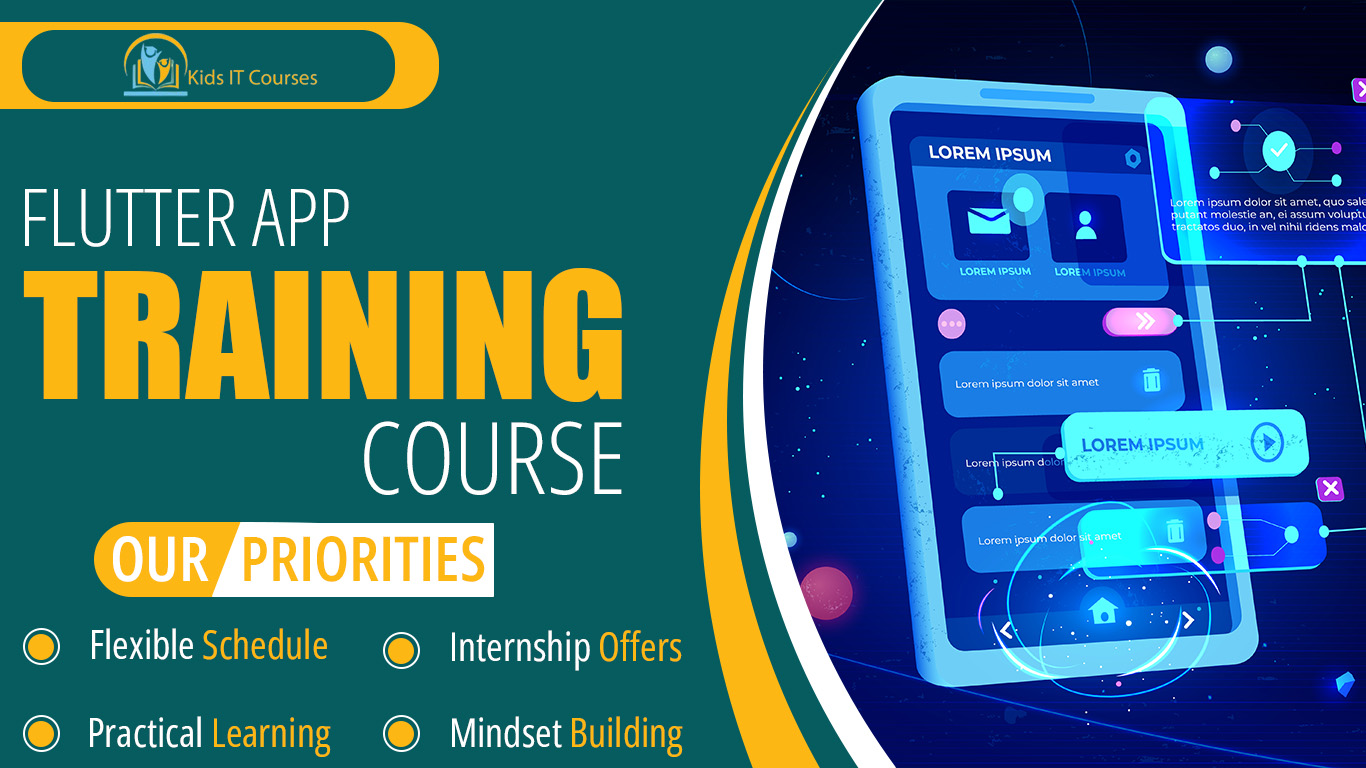
Flutter App Development Course for Kids
Definition
•Kids learn to build apps that work on both Android and iPhones. Flutter helps them create real, working apps easily.
•Flutter lets kids drag, drop, and design colorful app screens. They can choose buttons, colors, text, and more!
• Kids write simple code in Dart, the language behind Flutter. It’s easy to learn and fun to use for beginners.
•They learn how to make their app work step by step. It teaches planning, fixing errors, and thinking smart.
•Flutter is used by real app developers. Kids get hands-on practice with professional tools.
•They build games, to-do lists, or story apps they can show friends. Creating something real makes learning exciting!
• Flutter is growing fast in the tech world. Learning it early gives kids a strong head start in app development.
Flutter App Training | Winter Kids Courses Nearby Rawalpindi
Importance
• Flutter helps kids build apps that work on Android and iPhones. They feel excited creating apps just like real developers!
• Kids write one set of code, and it runs on many devices. It makes learning easier and super smart.
• They design beautiful app screens using colors, buttons, and text. It helps them bring their own ideas to life.
• Flutter teaches how to think in steps and fix errors. This sharpens their brain and builds focus.
• Flutter is used in real companies and apps today. Learning it early gives kids a strong start in the tech world.
• Kids build real apps like to-do lists, games, or stories. They learn best by doing and seeing results.
• Creating their own app makes kids feel proud and capable. They can even show it to friends, family, or teachers!
Advantages for Freelancing
• Kids learn to build apps that work on Android and iOS. They can create fun and useful apps with their own ideas!
• Flutter lets kids design colorful buttons, screens, and layouts. They turn their ideas into real app designs.
• Flutter uses a language called Dart, which is easy for beginners. Kids can start building apps without getting confused.
• They learn to plan, code, and fix errors step by step. This improves their problem-solving and concentration.
•With Flutter, kids see their changes on the screen right away. It makes learning fast and super fun!
• Kids can create games, calculators, or story apps. They love seeing their creations come to life.
• Flutter is used by companies worldwide to build apps. Learning it early gives kids a head start in the app world!
Session 1 : Introduction to Flutter
What is Flutter and why it’s popular for mobile app development
Real-life example: A designer who can create apps for both iOS and Android with the same code
Setting up Flutter on your computer (Flutter SDK, Android Studio)
Exploring Flutter’s widget-based architecture
Activity: Create your first “Hello World” Flutter app
Session 2 : Understanding Widgets and Layouts
What are widgets in Flutter and how they are the building blocks of an app
Real-life example: Legos, where each piece builds part of the structure (widgets)
Introduction to stateless and stateful widgets
Basic layout widgets:
Container,Column,Row,StackActivity: Create a simple layout using multiple widgets
Session 3 : Styling Your Flutter App
How to style widgets using the
styleproperty and custom themesReal-life example: Decorating a room with furniture and colors (styling)
Using
TextStyle,BoxDecoration, and other Flutter styling propertiesActivity: Style your app with custom fonts, colors, and padding
Session 4 : Handling User Input in Flutter
Managing user input with
TextFieldand other input widgetsReal-life example: A login form where users type their username and password
How to validate user input and show error messages
Activity: Create a login form that collects user credentials
Session 5 : Navigation and Routing in Flutter
What is navigation and how do you move between screens in Flutter?
Real-life example: A map that guides you from one location to another (app navigation)
Setting up
Navigatorand routing between pagesActivity: Build an app with multiple screens and navigation between them
Session 6 : Managing State in Flutter
What is state and why it’s essential for interactive apps
Real-life example: A shopping cart that updates when you add items (state management)
Using
StatefulWidgetandsetState()to manage state in FlutterActivity: Create a simple counter app that increases when you press a button
Session 7 : Working with APIs and Data in Flutter
Fetching data from an API and displaying it in your Flutter app
Real-life example: A weather app that shows live weather data from an API
Using the
httppackage to fetch and display dataActivity: Build an app that fetches and displays a list of items from a mock API
Session 8 : Final Project – Build a Complete Flutter App
Plan and build a fully functional app using Flutter
Implement widgets, navigation, state management, and API integration
Test your app on both Android and iOS simulators
Activity: Present your app, demonstrating its key features
Bonus Materials
Flutter cheat sheet with common widgets and commands
List of Flutter plugins and packages to enhance your app
Flutter developer resources and community links
Interactive coding challenges and quizzes
Certificate of Completion for Flutter Basics
